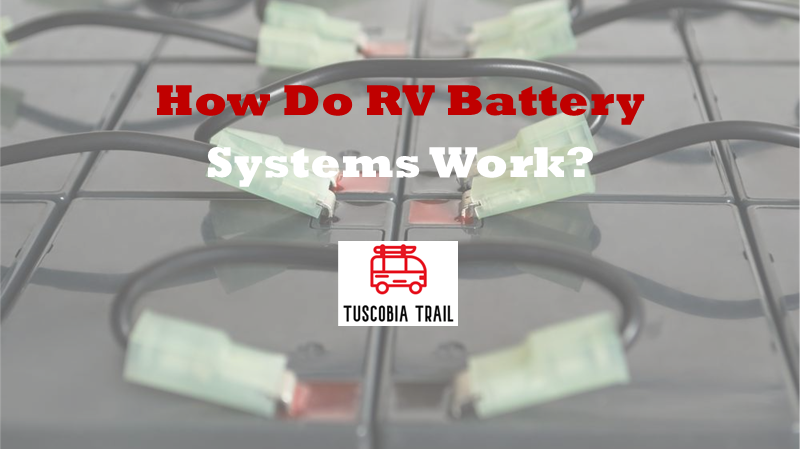RV battery systems are the lifeblood of your mobile home, providing power for essential appliances, lighting, and comfort features. But for beginners how do RV battery systems actually work?
Understanding how these systems work is crucial for any RV owner or enthusiast because you are unlikely to be able to live life on the road without it.
From having the right electrical system for your RV to ensure a full battery to being able to troubleshoot if your solar system or charging system goes does, we have a full guide.
Dual Electrical Systems For RVs
RVs typically feature two distinct electrical systems: a 120-volt AC system and a 12-volt DC system.
The 120-volt system powers major appliances like air conditioners and refrigerators, while the 12-volt system runs interior lights, water pumps and fans. You can also run 12v air con too.
Battery Types and Banks
RV owners often create battery banks by connecting multiple batteries in a series to increase capacity or voltage.
RV batteries can be charged through various means including shore power (electrical hookups), onboard generators, solar panels and vehicle alternator in vans or motorhomes.
RV batteries come in several varieties like deep-cycle batteries, flooded wet-cell, Absorbed Glass Mat (AGM), gel-type and Lithium batteries.
The latter (Lithium) are more expensive but offer longer lifespan and better performance, but offer the best lifespan of power.
Lithium batteries offer significant advantages over lead-acid batteries in terms of maintenance requirements too as they eliminate the need for regular maintenance tasks.
The maintenance-free nature of lithium batteries contributes to their extended lifespan compared to lead-acid batteries and there are no toxic gases produced during operation.
Lithium batteries also maintain their performance throughout their lifespan without the gradual degradation often seen in lead-acid batteries.
You can also use powerbanks and portable power in your RV as an alternative battery system.
Best Battery Systems For RVs
When comparing the best batteries for RV use, lithium batteries, particularly LiFePO4 (Lithium Iron Phosphate), stand out for their longevity, efficiency, and maintenance-free operation.
Here’s a breakdown of the top options available based on van lifers’ using them:
1. Battle Born LiFePO4 Deep Cycle Battery
Type: Lithium
Capacity: 100 Ah
Warranty: 10 years
Features: Lightweight (29 lbs), excellent cycle life (up to 5,000 cycles), and no maintenance required.
2. XS-Power-D3100
Type: AGM (Absorbent Glass Mat)
Capacity: 110 Ah
Warranty: 2 years
Features: High cold cranking amps (1360), suitable for deep cycling and starting applications.
3. ExpertPower EP1233 Deep-Cycle Battery
Type: Lead-Acid
Capacity: 33 Ah
Features: Budget-friendly option with decent performance for lighter loads.
4. Interstate Batteries AGM DCM0035
Type: AGM
Features: Known for reliability and long life in deep-cycle applications.
5. Renogy 12 Volt Deep-Cycle AGM Battery
Type: AGM
Features: Good performance with a focus on durability.
6. Trojan T-105 Plus Series
Type: Flooded Lead-Acid
Features: Excellent for deep cycling; a trusted name in RV batteries.
7. Optima Batteries 8016-103
Type: AGM
Features: Dual-purpose battery suitable for both starting and cycling, known for cold weather performance.
8. Odyssey PC925 Battery
Type: Lead-Acid
Features: Compact and lightweight, ideal for space-constrained applications.
Maintenance and Care For RV Battery Systems
Proper maintenance is key to battery longevity and is a must to ensure your power system works when you need it.
Understanding and maintaining your RV’s battery system ensures a reliable power supply for all your adventures. Regular care and proper usage will extend battery life and enhance your overall RV experience.
It’s recommended to monitor and maintain electrolyte levels for flooded batteries, keep terminals clean and free of corrosion, recharge batteries promptly and regularly and use appropriate chargers for your battery type.
FAQs
How long do RV batteries typically last?
Lifespan varies by type. Lead-acid batteries may last 3-5 years, while lithium batteries can last up to 10 years or more with proper care.
Can I use solar power to run my RV’s air conditioner?
While possible, it’s challenging and requires a large solar array and battery bank. Most RV solar setups are designed for charging 12-volt systems and running smaller appliances.
How often should I check my RV’s battery water levels?
For flooded lead-acid batteries, check water levels monthly during heavy use or every 3-6 months during storage. AGM, gel, and lithium batteries are maintenance-free in this regard.
Is it safe to leave my RV plugged in all the time?
While convenient, constant shore power can lead to overcharging and reduced battery life. Use a smart charger or disconnect the batteries periodically if storing long-term.
How can I tell if my RV battery needs replacement?
Signs include difficulty holding a charge, swelling or leaking, dimming lights, and slow engine cranking. Many modern lithium batteries have built-in management systems that indicate when replacement is needed.
